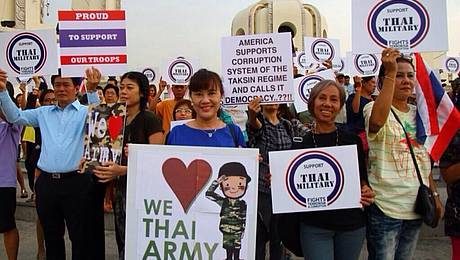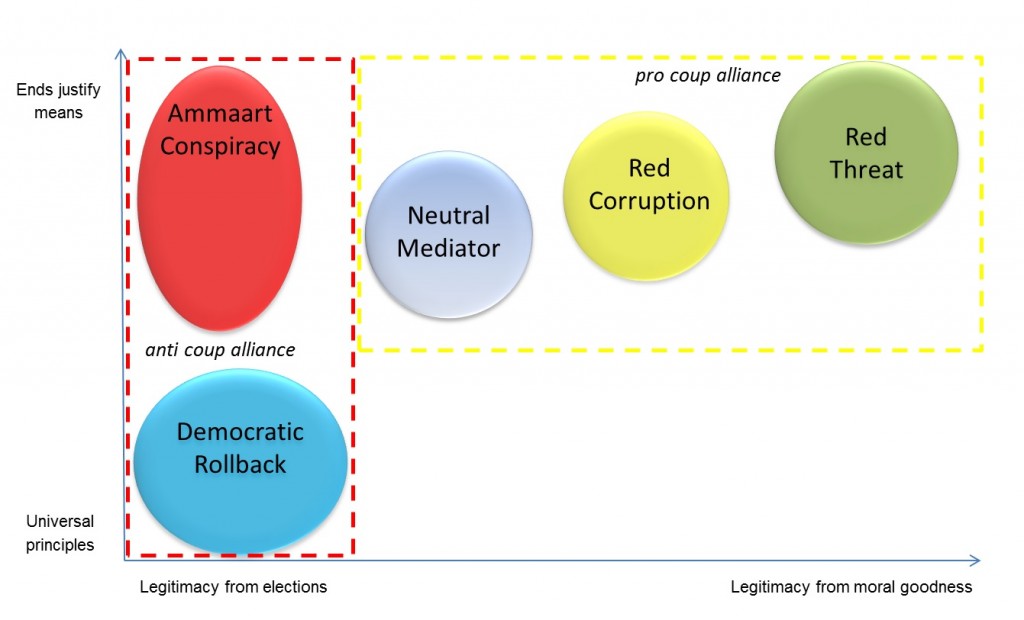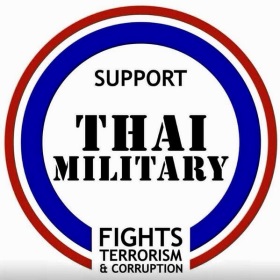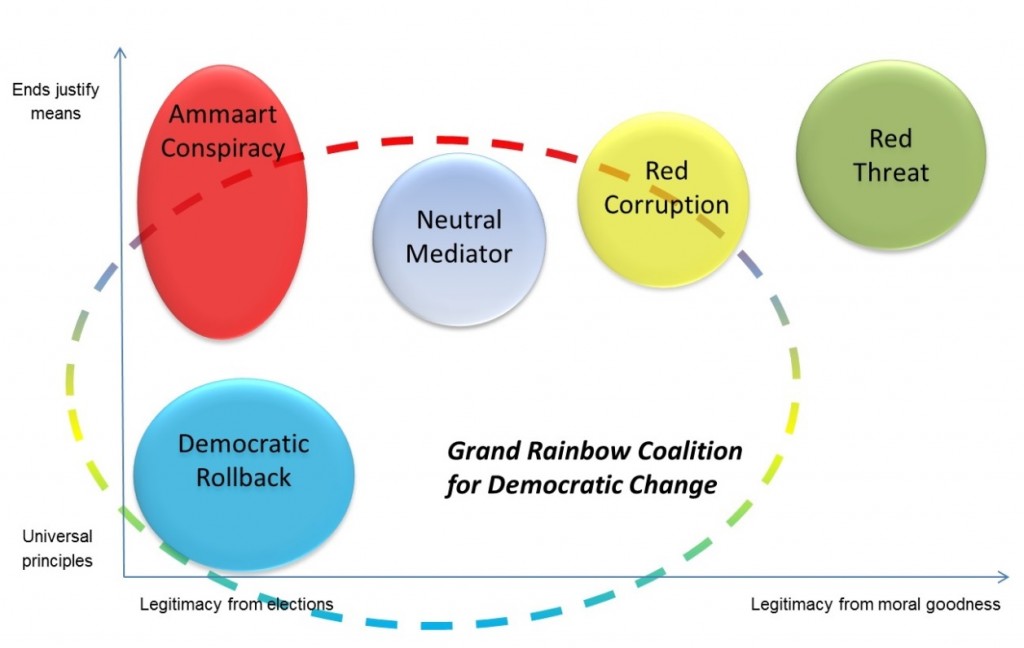Siamese Dreams: The junta, the middle class, and how to overcome the transformation crisis.
After much ado, it’s been a coup. After seven months of people’s coups, stealth coups, judicial coups and half coups, Thailand’s generals showed that they still had it in them to stage an old fashioned military coup. Underscored with patriotic songs, the waves of arrests, media blackouts and hourly junta announcements create a chilling cold war atmosphere.
Thailand’s 19th military coup is the latest climax in a nine year old power struggle between the allies of former Prime Minister Thaksin Shinawatra and the historical elites over the political and economic control of the country. On a structural level, the struggle between those who benefit from the status quo, and those who want change reflects the transformation of Thai society.
Why did it take the military seven months of deadly conflict to cave to the pressure to intervene? The top brass was wary of potential risks ranging from an insurgency of pro-government red shirt militias to mass desertions in its own ranks. Heavy pressure from the international community kept the generals on the fence. Many in the historical elite would have preferred a face saving judicial coup, but struggled to cut their way through the legal underwood. Eventually, the hardliners prevailed, and they seem to be prepared to purge the “Thaksin regime” at all cost. International calls for restraints are dismissed as “interference”, and international media are being publicly denounced as “scoundrels”. The arrest of a government minister in front of rolling cameras made clear that the generals are not ready to bow to international pressure.
The hardliners are in control now
And the hardliners are here to stay. With the dissolution of the Senate, the junta brushed aside the last remaining democratic fig leaf, thereby officially ending all attempts to create the illusion of a legal process. The setup of a national assembly tasked with rewriting the constitution and a national reform council mandated to reform just about everything is creating the governance infrastructure to run the country. The hardliners seem determined not to repeat their “mistake” in 2006, when the last junta failed to fully dismantle the political and economic machine of their opponent. Elections have been set for October 2015, giving the junta plenty of time to reorganize the country.
However, can a Cold War style coup prevail in the fundamentally changed social reality of 21st century Thailand? Historical coups relied on the use of force, or at least the credible threat of it. International pressure, combined with the expectations of Thai civil society, pose significant constraints on the use of force. To be sure, there are still two Thailand’s: the world of the Bangkokian citizens more of less under the protection of the rule of law, and the world of the provinces, where the value of human life is relative. Still, the omnipresence of social media, well- organized grassroots movements, and international watchdogs make it improbable that a full “Egyptian style” crackdown can be carried out without the world watching. It remains to be seen if the generals stick to surgical strikes combined with indiscriminate arrests to spread terror, or, when the going gets tough, are ready to radicalize repression.
Thai society reacted to the coup alongside established color lines. Only a few hours after the coup, protests started spreading all over Thailand, reminding the generals that the underlying conflict is all but solved. On the other hand, opinion polls, whatever their accuracy, show that a majority of Thais approves of the coup. Bangkok’s conservative middle class seems jubilant, displaying a disturbing sense of triumphalism, vengefulness and hope.
The junta is playing on an unfamiliar battlefield
The junta’s ability to deliver its promise to “maintain peace and order”, let alone “healing the rift” and “promoting national unity and reconciliation” depends on the popular perception of its legitimacy. This means the generals are playing on an unfamiliar battlefield: the world of discourses over legitimacy claims.
Five discourses dominate the attitudes of most Thais vis-├а-vis the coup.
The “Ammaart Conspiracy” discourse interprets the coup as the last stand of a declining feudal class, desperately trying to save its status and privileges. The ‘”ammaart conspiracy”, or the concerted effort of the historical elite network to use their strongholds in the judiciary, independent commissions, the Senate, bureaucracy and the military to rig the political playing field, is a popular narrative among red shirts. Wildly oscillating between a paranoid fear of the all-powerful elites, and a determinist sense that history is on their side, many people in the North and Northeast have interpreted the political conflict in Bangkok through this lens. Resistance to the coup is driven by a strong sense of injustice that yet another elected government has been overthrown by the long arm of historical elites.
The “Democratic Rollback” community fears that the military regime sets Thailand “back to the stone age” of its long history of coups and massacres. Mostly students from Bangkok’s cosmopolitan middle class have long called to “Respect My Vote”. Scholars have repeatedly pointed out the divisive impact of the last coup on Thai society, mocking “how many times do you want to repeat the same mistake and expect a different outcome?” Anti-coup protesters angrily ask “Thai democracy always gets aborted, when will it be born?” This discourse resonates well with the international community and its concerns over a global “democratic rollback” (Joshua Kurlantzick, Democracy in Retreat: The Revolt of the Middle Class and the Worldwide Decline of Representative Government, New Haven & London: Yale University Press, 2013). It therefore does not come as a surprise that international observers write scathing condemnations of the demolition of the democratic order.
The “Red Threat” discourse has two dimensions. Popular fear of the “Thaksin regime” reflects elite anxiety over a “monopolization of power” by former Prime Minister Thaksin Shinawatra with his history of human rights abuses and authoritarian strong hand politics. On the other hand, many Bangkokians were terrified by the “burning of our holy city” in the wake of the crackdown against red shirt protests in 2010. Nightly assassinations and grenade attacks gave rise to the “red shirt terrorism” narrative. Red shirts leaders nurtured this fear by threatening armed resistance, secession and even civil war. The early actions of the junta seem to be informed by this logic, and suggest a strategy of decapitating the red alliance, hoping to uproot an insurgency before it even starts. This strategy reveals a worldview which sees anti-coup protests instigated by individual “trouble makers”, and believes that by “rooting out” the bad seeds and cutting of the paymaster, resistance will collapse. This is in line with a conservative worldview unable to see the fatal flaws of an eroding order, thus blaming individual “bad people” for social conflict. In a fascist variation, opponents are dehumanized as “nak paendin” (burden of the land) or simply “garbage” which has to be “exterminated”. The “red threat” discourse is widely shared by historical elites and the protesters from the South. It also resonates well with Bangkok’s middle class contempt for rural “uneducated people” and “red buffalos”.
The “Red Corruption” discourse reflects anger over the “populism” and “moral rot” of consecutive red governments. Proponents claim that “over the last ten years, corruption has gone out of control”. The conservative middle class, in particular, is afraid that “corrupt politicians abuse our tax money to finance populists programs in order to buy the votes of the greedy poor”, thereby risking to bankrupt the state and wrecking the economy. Many of those fears have been projected on the subsidies for rice farmers, which is credited for “the greatest losses in Thai history”. Most importantly, the “red corruption” discourse equates democracy with corruption. This is one of the unforeseen effects of (flawed) electoral democracy: elected representatives tend to bring the feudalist logics of the provinces to the capital. Bangkokians, however, interpret the patrimonial practices of protecting clients, favoring kin, rewarding supports and distributing spoils as sliding back into the dark ages of “rampant corruption” and “vulgar nepotism”. Hence, “cleaning out the red mess” is necessary “to bring our house in order”. The “red corruption” discourse echoes the greater “moralist discourse world” with its fear of “moral decay”. Rooted in Theravada Buddhism, corruption is seen as bringing “suffering” and “bad kamma” into the world, thereby disrupting the good order of things. If corruption is caused by “immoral individuals”, then the problem can and indeed must be fixed by exchanging “bad people” with “good people”.
Finally, the “Neutral Mediator” discourse expresses the hopes of all those who are sick and tired of Thailand’s partisan conflict, and fear an imminent escalation into civil war. A military coup, from this perspective, is a “lesser evil”, even a “Thai way to allow both sides to save face”, something that foreigners cannot possibly hope to understand. From this perspective, a “neutral” mediator is needed to calm down both sides by “giving them time to think”. In this ‘ends justifying the means’ logic, many hope that a “quick in, quick out” military intervention can fix urgent problems like the use of war weapons to instigate violence, correct some flaws of the constitutional order, and then prepare the return of electoral democracy. Some even hope that the “clean” military “without vested interests” may finally break the blockade of governance and implement “good policies”. Middle class hopes projected onto the military are again rooted in the moralist discourse world, where “Good People” promote unity and harmony, while “Bad People” stir social conflict.
The fate of the junta depend on its support base
At this point, the “Amaart Conspiracy” and “Democratic Rollback” discourse communities oppose the coup, while the “Red Threat”, “Red Corruption” and “Neutral Mediator” communities support the military intervention. Given its lack of legitimacy, the junta’s ability to prevail will depend on its ability to keep its support base together. Fittingly, the carefully designed logo (notably in English and high resolution print) of coup supporters in social media and on the streets boasts to “Support Thai Army Fights Terrorism and Corruption” (sic), thus combining “red threat” and “red corruption” discourses.
However, keeping the pro-coup discourse alliance together may prove to be an impossible task. Cracks are already appearing in the elites. Those who supported the judicial coup may feel bypassed. Others seem to mourn the loss of face amidst the backlash by the international community. The junta leader’s micromanaging approach could make some feel cut out of the loop, while others may feel left out in the cold. Finally, inside the military, some may worry over a bottleneck in the coming reshufflement. On the other side of the aisle, “fighting the red threat” by purging Thaksin supporters in state institutions, private sector and civil society alienates many, while Cold War terror tactics like arbitrary detentions, military courts, and media shutdowns scare others. The fate of the current junta depends on its ability to broaden its narrow support base by buying in other elite networks. However, not all pending issues can be solved by pork barrel politics. As the row over the state enterprises signals, the honeymoon period comes to an end, and the going gets tougher.
Frictions within the elites make the junta even more dependent on popular support. In an ironic twist, the junta disrupted electoral democracy, but seeks to legitimize its rule by public opinion polls. However, it is noteworthy that the detained academics, activists and journalists are members of the Bangkokian middle class. Hence, with the authoritarian crackdown continuing, middle class contempt against “greedy and uneducated buffalos”, may give way to fear of “elite abuse”. Another trade-off is between the hopes for fundamental reform of the “red corruption” community, and the hopes for a “quick fix, quick out” of the “neutral mediator” community. Junta declarations to “stay as long as it takes to create peace and order” already worried some that the military may “overstay its welcome”. In the long run, the patronage system which the junta seeks to protect needs to reward supporters, protect clients, favor kin and distribute spoils, thereby alienating the “cleaning our house” “red corruption” community. Finally, if history is any guide, the junta lacks the capacity to manage a complex upper-middle-income economy deeply integrated into the international division of labor and highly vulnerable to external shocks and pressures. Deteriorating business’ and investor’s confidence may hurt the economy, particularly the middle class support base. In sum, the pro-coup discourse alliance has plenty of built-in contradictions, which the junta’s course of action will likely deepen further. Hence the junta will soon find out that with every day in power, its support base will crumble.
On the other side of the spectrum, anger and despair of those opposing the coup is likely to grow with every crackdown, arrest and harassment. Having lived through numerous coups, Thais know to bend like grass when the wind is blowing hard. However, by the logic of asymmetrical conflict, the use of force will achieve little, and only increase the resistance it seeks to crush. The “red threat” fighters may find out that every time they cut off a head of the red dragon, a new one will grow. Be that as it may, “ammaart conspiracy” community would be well advised to stay clear of any violence. In the logic of asymmetrical conflict, violence stabilizes the very regime it seeks to fight. The junta would surely use violent incidents to rally people around the flag, and justify continued repression with the need to “maintain peace and order” against the enemy within.
Immediately after the coup, peaceful resistance was mainly organized by the “democratic rollback” community. While the world was watching, condemnations of detentions and violations of the freedom of expression effectively framed the junta as a military dictatorship. Orwell “1984” readings and “Hunger Games signs” further promote associations of a righteous rebellion against an oppressive regime. These messages, however, are preaching to the already convinced, and fail to impress the pro-coup alliance. If anti-coup protesters fail to come up with a message which resonates with the angry urban middle class, the regime may successfully paint them as “mere handful of trouble makers who simply don’t understand the special situation and the benign nature of this coup”. Hence in the long run, success and failure of democracy activists will depend on their ability to reach out to coup supporters, and co-opt them into a broad societal coalition for democratic change.
Structural forces undermine the ability of the junta to achieve any lasting changes. Denouncing anti-coup protesters as “paid scoundrels” who “don’t love our country” shows the junta’s failure to understand that coup resistance is not stirred up by individual instigators, but reflects a fundamentally changed social reality. The goal of the junta to restore the traditional order with its vertical social and moral hierarchies and exclusive top down decision-making processes is anathema to a vibrant modern society with its diversity of lifestyles and identities, and a plurality of values and interests. The modern construction of social reality understand the polity as a community based on consent. The radical shifts in habits and outlooks between the generations seals the fate of the cosmological foundation of the old order. The spirit of modernity is out of the bottle, and cannot be pushed back in. In other words, the social contract of the feudalist order has been terminated, and cannot be re-imposed by force.
With a fragile support base and growing resistance, the military will find it hard to keep its promise to “maintain peace and order”. Purging an entire political class is fundamentally at odds with declarations to “heal the rift” by “promoting national unity” and “creating reconciliation”. The junta’s determination to impose solutions onto society cannot “stamp out color coded politics”, as the new rules will be resisted by those they were imposed onto.
There is a widespread misunderstanding of military juntas as powerful and stable. As the aggressive suppression of any criticism shows, the exact opposite is true. Governments without legitimacy are highly vulnerable and fragile. As Napoleon famously said: “You can do everything with a bayonet, except sit on it.” Shoring up the legitimacy of a crumbling political and social order by gunpoint cannot work, and will most likely produce the opposite outcome.
The way out of the transformation conflict
The only way to overcome Thailand’s transformation conflict is to adapt its political and social order to the needs of a complex economy and pluralist society. As those who benefit from the status quo have made perfectly clear, they are not willing to allow the majority of the people full participation in political, social and cultural life.
A genuine democracy, thus, can only be the outcome of a struggle. In order to win this struggle, it is indispensable to bring the conservative middle class back into the democratic flock. This is why a violent strategy would backfire and eventually fail. In order for democracy to function, the extremes need to be marginalized by a strong democratic center. Democracy needs a social foundation beyond the majority population, but needs to include the middle classes. In order to recruit the angry middle class into a Grand Rainbow Coalition for democratic change, grievances over corruption, incompetence and abuse of power cannot simply be dismissed as “anti-democratic”, but must be properly addressed.
The new social contract need to be more than an adaptation of the political system to include more stakeholders in the policy making process. The new social contract will have to square the circle of empowering society to fully take charge of the policy making process, while giving reassurances and safeguards to the embattled elites. It needs to give the middle classes something in return for bankrolling the state. And it needs to convince the majority population that long term emancipation is more important than quick gains. What is needed is a positive vision for the society of tomorrow, a utopia which can break the obsession with the past and encourage Thais to embrace their Golden Moment at the outset of the Asian century.
This is why constitutional engineering will not work. The new social contract must be based on a social compromise between all classes to tackle the crisis of social justice at the root of the transformation conflict. A policy paradigm shift is needed to provide equal opportunities for all to fully participate in political, social, economic and cultural life.
The ‘Good Society with full capabilities for all” allows to build a democratic change coalition between the middle class with its focus on personal achievement, and the majority population who seeks equal life chances. Catering to the hopes and needs of the vast majority, the capabilities approach offers a powerful political platform, and a way to win an electoral mandate without patronizing “populist” handouts. Economically, investing in human capital offers the way out of the middle income trap by moving up the value chain. Empowering people to take their life into their own hands will help them to emancipate from the patronage system, and ease the structural needs for corruption and nepotism. Addressing the crisis of social justice will ease the social conflict to a point where society can assemble in the center to build the democratic arena in which they will later compete. A social contract to build the ‘Good Society with full capabilities for all’ is the way to overcome the transformation conflict.
Marc Saxer is a political analyst holding political science and law degrees. Working and living in Bangkok, he has been a long-time observer of Thai politics.
 Facebook
Facebook  Twitter
Twitter  Soundcloud
Soundcloud  Youtube
Youtube  Rss
Rss 


